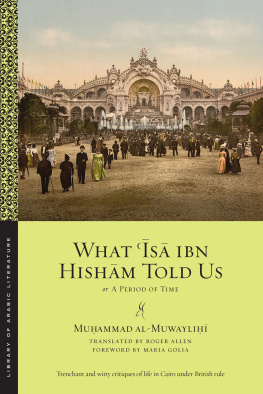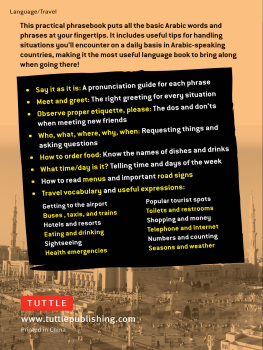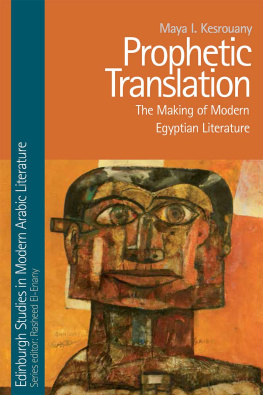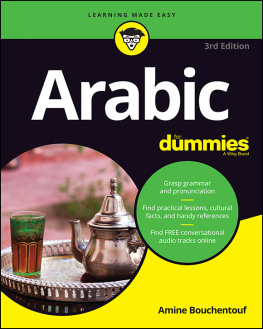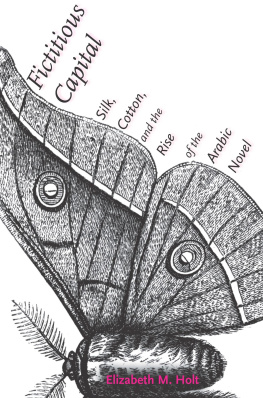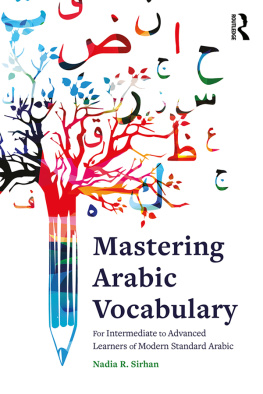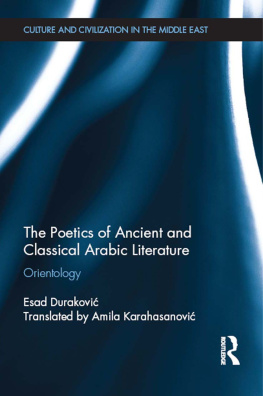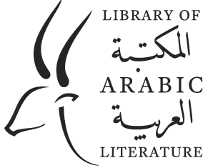The Author: Muammad al-Muwayli
Muammad al-Muwayli was born on the 30th of March, 1858, into an illustrious family that traced its origins to the town of Muwayli on the coast of the ijz in the Arabian Peninsula. His father, Ibrhm al-Muwayli (18431906)only fifteen years older than his son, had inherited the family silk business along with his brother Abd al-Salm, and both brothers were closely involved in the political life of Egypt during the reign of the Khedive Isml (r. 186379).
For a brief period at the age of ten, Muammad attended the famous school at Khurunfish in Cairo which was run by the Jesuit order and catered for the sons of the aristocracy, but from the time he was fifteen he was taught privately. As a young man he made the acquaintance of many of his fathers friends, among whom Jaml al-dn al-Afghn and Muammad Abduh.
In 1872, Ibrhms fortunes suffered a severe setback. He had been attracted to the newly founded Stock Exchange, and in the course of speculation lost the 80,000 pounds which had been bequeathed to him by his father.
Following the financial crisis of 1879, the Khedive Isml was forced to abdicate and went into exile in Naples. He invited Ibrhm al-Muwayli to join him as his private secretary and tutor to Prince Amad Fud (later King Fud the First). On April 5, 1882, Muammad became a clerk in the Ministry of Justice, but he did not remain in the post for long. In June, Abd al-Salm al-Muwayli left for Syria to convalesce from an illness, and Muammad was left on his own during the turmoil which led up to the revolt of Amad Urb, the riots in Alexandria, and the subsequent British landing and occupation. Ibrhm had sent his son a leaflet he had written in support of the Nationalists, entitled Al-Jannah tata ill al-suyf (Paradise Under the Shadow of Swords), and Muammad was arrested distributing copies of this document. Put on trial before a military court on the orders of Uthmn Psh, the Minister of the Interior, he was condemned to death. However, Burus Ghl Psh, a friend of the Muwaylis who was Permanent Under-Secretary to the Minister of Justice (Wakl al-aqqniyyah), interceded on Muammads behalf with the Khedive Tawfq, claiming that Muammad had been encouraged by his father, that his unclewho was his official guardianwas convalescing in Syria, and that he was not old enough to be considered politically troublesome. The sentence was commuted to exile.
Muammad now joined his father in Italy, where he learned Italian and some Latin, and continued his studies of French with a lawyer friend of his father. He also helped his father to produce the newspaper Al-Ittid. But the Ottoman Sultan wrote in 1880 expressing his displeasure at the views published by the newspaper, so the Khedive Isml was compelled to order Ibrhm to stop printing. In 1884, Isml sent Ibrhm to Paris from Italy, and Muammad accompanied his father. In the French capital both Ibrhm and Muammad al-Muwayli helped Jaml al-dn al-Afghn and Muammad Abduh with the publication of Al-Urwah al-Wuthq. This newspaper was to have a tremendous influence in the Arab Middle East, not only because of its outspoken attacks on the British presence in Egypt and the evils of excessive Westernization, but also because of its advocacy of the idea of Pan-Islam based on the Ottoman Caliphate. The Muwaylis were later to support all of these points of view with vigor in their own newspaper following their return to Egypt.
The fourth issue of Al-Ittihd was circulated in Europe, Turkey and Egypt, and its criticism of the Ottoman Sultan caused a considerable stir. The Ottoman court contacted its ambassador in Paris, and, despite protests in Le Figaro, Ibrhm was expelled from the country and traveled to Brussels. Al-Afghn wrote from London at that time, and suggested Ibrhm and Muammad come to England. Father and son accepted the invitation. Once there, they assisted al-Afghn in the publication of further issues of Al-Urwah al-Wuthq. Ibrhm himself produced further issues of Al-Ittid and Al-Anb as well as a new newspaper called Ayn Zubaydah. During their stay in London, the Muwaylis were introduced to Lord Randolph Churchill and Lord Salisbury, but any further entres into British political society were cut short by another turn of events.
Ibrhm had been changing his tack somewhat by supporting the Ottoman government in his newspapers through fierce attacks on the policies of Gladstones government, and this seems to have pleased the Sultan. Hagopian Psh, the Nir al-Khaah al-Sulniyyah (Supervisor of the Sultans Entourage) was sent to London in January 1885. We learn that he, together with Qastk Psh, the Ottoman ambassador in London, tried to persuade Ibrhm to go to Istanbul where, they asserted, he would discover that the Sultan had forgiven him for the unfavorable comments he had made in his newspapers in the past. But, with the memory of his recent expulsion from France still fresh in his mind, Ibrhm was (not unnaturally) dubious about the Sultans intentions, and sent Muammad to Istanbul to find out the real terms of the invitation. When Muammad confirmed that the Sultans offer was sincere, Ibrhm came to Istanbul and was appointed a member of the Education Council. Ibrhm soon made the acquaintance of Munf Psh, the Minister of Education, who allowed Muammad to use the Fti Library with its large collection of manuscripts. Among the works which Muammad al-Muwayli transcribed were


